Weather radios are an interesting genre of radio. Some of them are specifically designed as emergency radios and some are general coverage radios with a weather feature added. I seem to have accumulated 8 weather radios. Here’s the photo array:
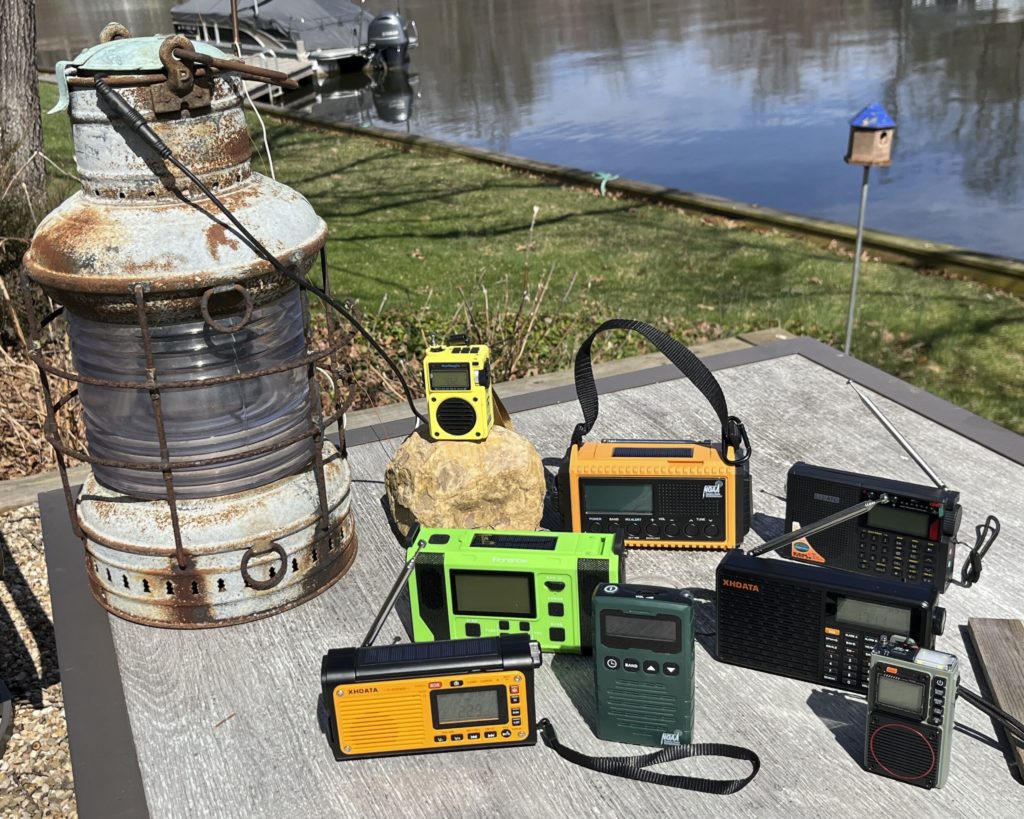
Second row: iRonsnow IR-688, XDATA D-109WB
Third row: XHDATA D-608WB, Mesqool CR1015, Raddy RF75A
Disclosure: XHDATA provided me with a pre-sales version of D-608WB in exchange for my input on their product manual. The radio tested here may not be the final version. I am under no obligation to review the radio publicly or to say nice things about it.
I used to own a Eton SolarLink FR360 weather radio, but it got wet and died. I had a really nice Kaito KA600, but its case got all sticky and gooey and it went somewhere (not sure). The radios tested here are on the low end of the emergency radio market. The Mesqool CR1009 Pro and the iRonsnow IR866 have been donated to Goodwill and replaced with a Zhiwhis ZWS-2415. (Looking at my Amazon order history, it looks like several weather radios ended up at Goodwill.)
For those outside North America or have no experience with weather radios, this is what one sounds like when receiving an alert:
It seems to me that one can break the weather radio genre down into to groups: emergency radios and general purpose radios that also receive weather band. In the emergency category, one looks for a radio that receives weather alerts (which all of these do), one that receives local broadcast radio stations and one that has a big battery to power it (and maybe something else) when the electric power goes off. The general purpose radios need to be good radios in general.
Review of the contestants
Naturally this calls for a big table of comparable features:
| Feature | CR1009 Pro | D-109 WB | Rd239 | D-608 WB | RF75A | CR1015 | HRD-701 | HRD-757 | IR-688 | ZWS-2415 |
|---|---|---|---|---|---|---|---|---|---|---|
| LW | Y | |||||||||
| MW | Y | Y | Y | Y | Y | Y | Y | Y | Y | Y |
| SW MHz | 2.3 – 22 | 17.11 – 29.999 | 3.2 – 29.999 | 17.11 – 29.999 | 4.75 – 21.850 | 2.3 – 23 | 4.5 – 21.850 | 3.2 – 30 | 3.2 – 22 | 3.20 – 21.95 |
| FM | Y | Y | Y | Y | Y | Y | Y | Y | Y | Y |
| AIR | Y | Y | Y | |||||||
| VHF | Y | Y | Y | Y | ||||||
| UHF | Y | |||||||||
| Alert | Y | Y | Y | Y | Y | Y | Y | Y | Y | Y |
| Flashlight | Y | Y | Y | Y | Y | Y | Y | |||
| Reading Light | Y | Y | Y | Y | ||||||
| SOS | Y | Y | Y | Y | Y | Y | ||||
| Battery Type | 21700 and 3 AAA | 18650 | BL-5C or 3 AA | 18650 | Internal | 3 AAA | BL-5C | 18650 | Internal 3 AAA | Internal |
| Battery Capacity (mAh) | 5000 | 2000 | 2000 | 3000 | 1000 | 2500 | 10000 | 10000 | ||
| Solar panel | Y | Y | Y | Y | Y | |||||
| Hand crank | Y | Y | Y | Y | ||||||
| Charge phone? | Y | Y | Y | Y | ||||||
| Power | USB Micro | USB-C | USB-C | USB-C | USB-C | |||||
| ATS | Y | Y | Y | Y | Y | Y | Y | |||
| Color | Orange | Black | Black | Yellow | Gray | Green | Yellow | Black | Yellow | |
| Alarm | Clock only | Y | Y | Y | Y | Y | Y | Y | ||
| Weather proof rating | IPX3 | IPX4 | ||||||||
| Bluetooth | Y | Y | Y | Y | Y | Y | ||||
| MP3 | Y | Y | Y | Y | Y | Y | ||||
| Records | Y | Y | Y | |||||||
| Price 3/13/2024 | $35.00 | $46.50 | $55.90 | $40.50 | $46.74 coupon | $20.00 | $38.77 | $72 | $34.99 coupon | $34.64 coupon |
Zhiwhis ZWS-2415

We begin with the alphabetically challenged Zhiwhis ZWS-2415. It’s unique among the contenders because it combines the emergency format with a VHF band. It checks all the emergency radio boxes in terns of charging and alerts, but leans some into the general radio feature category like ATS. It also pushes the music area with Bluetooth, MP3 play and equalizer settings. And it has the flashlight, reading light, solar charge, crank charge and SOS siren stuff characteristic of an emergency radio.
So as an emergency radio, this one rates highly with a reasonably large 10000 mAh battery. That should give me too full charges on my iPhone. It’s IPx4 weather resistant.
It was the most sensitive of the lot on weather band, receiving my local KZZ28 plus some signal from 3 other stations. On FM, the performance was incredible, equal to the best FM radios I have ever tested.
The addition of a METER band button greatly speeds up tuning on shortwave.
While the speaker bass response is not competitive with the HRD-757, it can be turned up very loud and has good midrange performance, not at all tinny.
HanRongDa HRD-701
I don’t really think much about the HRD-701 being a weather radio, but it is and it is yellow. Weather alerts worked and it gets the weather station well. This tiny radio does quite a lot of things, but it is not an outstanding performer.
HanRongDa HRD-757
This is another Swiss Army Knife radio, sporting flashlight, MP3, Recording and VHF/UHF in addition to weather alerts. It has a very good sounding speaker.
iRonsnow IR-688
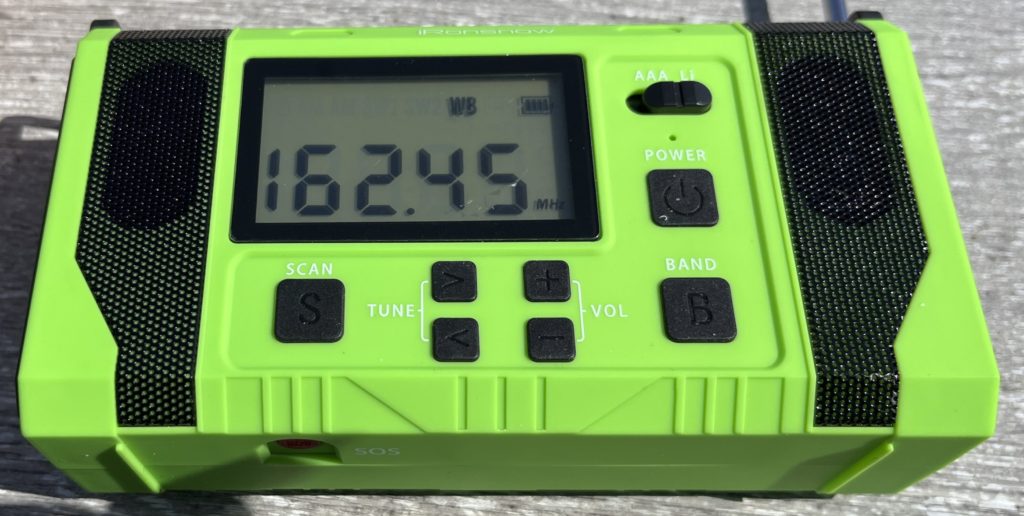
I picked this one up on sale in hopes that it would become my actual weather alert radio, to sit on the window sill and warn me of emergencies. I introduced it in, Before the battle: iRonsnow IR-688. It’s your basic moderately high-capacity battery weather radio adding shortwave and stereo speakers (very small stereo speakers). It’s not a great performer on the broadcast bands, but it picked up the local NOAA weather station with ease. For shortwave, a clip-on antenna will be mandatory. Weather alerts work well.
LiJiANi Rd239
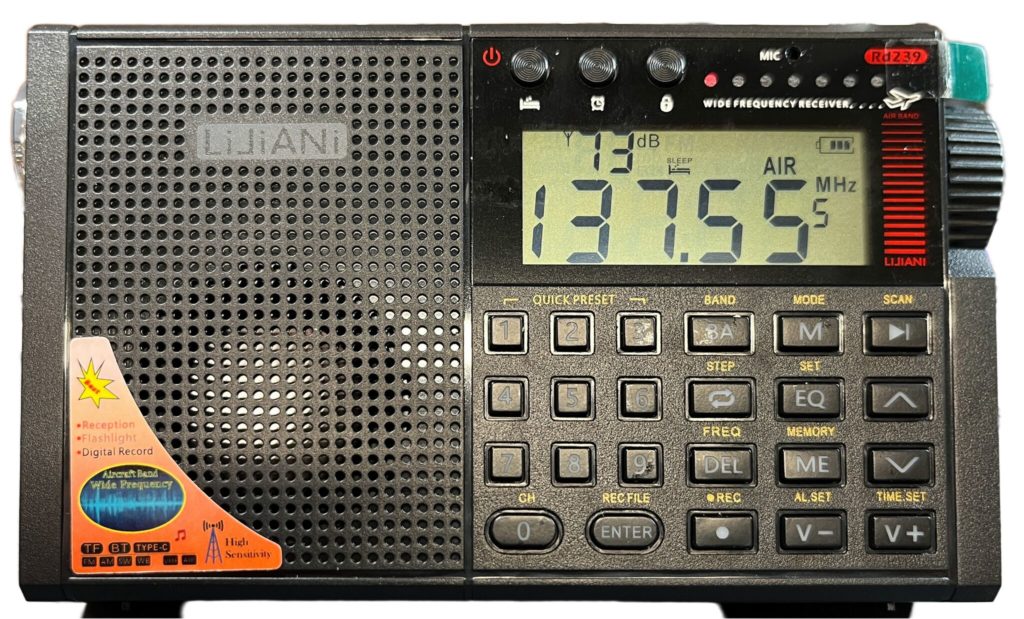
The Rd239 has its own article: LiJiANi Rd239: A different radio. It’s an interesting receiver, notable for user-installable firmware updates and wide frequency coverage (MW/SW/FM/VHF/AIR/WB). It’s also Bluetooth, MP3 and has a flashlight and reading light. It can also record from the radio. It’s fairly sensitive. It’s no slouch on weather band and the hazardous weather alert works.
Mesqool CR1009 Pro

This is one of my older weather radios, but it’s still available. When I received the first one, I noticed that when I tuned up it would skip MW stations that it found when tuning down. I figured that it was defective and sent it back for a replacement. The replacement had the same problem PLUS another problem where the weather broadcast volume would suddenly drop for a few seconds and come back. Needless to say, this is not one of my favorite radios. Also, the only tuning method is with a pair of buttons and tuning around shortwave simply takes forever. There is no station memory. It’s redeeming feature is a 5000 mAh 21700 battery and a solar panel. I’m donating it to charity.
Mesqool CR1015
This radio was almost a giveaway. Amazon bundled it withe CR1009 Pro for something well under $10, so I bit. It’s not a bad radio for what it is. It shares the tuning problem with the CR1009 Pro, taking a very long time to get anywhere on shortwave. But weather alerts work. Its manual says there is a clock, but there isn’t. It doesn’t perform well on MW and FM.
The radio was discontinued shortly after mine came out, and a new version appeared on the Amazon product page. It has a rechargeable battery in it, supposedly a clock, and some station memories for under $20.
Raddy RF75A
This one is tiny, very much a shirt pocket radio. It has wide coverage with MW / SW / FM / AIR / VHF and Weather. Weather alerts work. It also has a flashlight. It’s claim to fame is an accompanying mobile phone app that can control it, including setting the frequency and initiating off the air recording. It’s better than one might expect on MW and FM is in the middle. It too can play MP3 and has Bluetooth.
XHDATA D-109WB

The D-109 WB is the weather band version of the XHDATA D-109. It’s the only one in the group with longwave. It supports MP3, and answering your phone. This is one of the better performing radios in the group although it is reported to overload badly in the presence of local broadcast stations (not a problem where I live). It’s also one of the nicest to operate in most respects, although I don’t like the automatic variable speed tuning knob. It failed the weather alert test by frequently giving false alarms.
XHDATA D-608WB
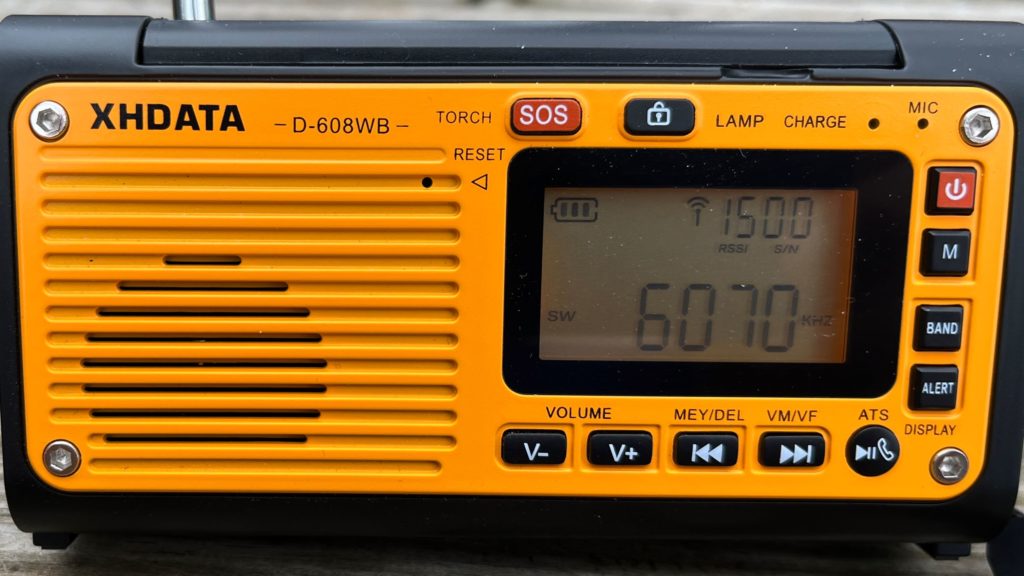
This is the newest kid on the block, for sale only a few days. XHDATA sent me one in exchange for advice on improving their manual. I rewrote it and I hope they will use some of what I sent them. This radio does lots of things right and even though it doesn’t have direct frequency entry, it is able to skip through the shortwave bands, and it has an effective scan feature. Mine is defective causing it to be deaf on FM (I read somewhere this was an issue in pre-production units). It failed the weather alert test by giving false alarms. XHDATA’s excuse was “we can’t test it in China.” It has a nice speaker, by the way.
Weather alerts
All of the radios in this review have a weather alert feature: they periodically scan the weather band listening for a tone of 1050 Hz and play an alert siren to alert the user. Today (Wednesday) is the day when the NOAA weather station in my area does its test, so I set up all the radios well in advance of the test to ensure that they all worked — only some worked a little too well: both of the XHDATA entries, D-109WB and D-608WB, gave false alerts.
It turns out that there was a low-volume tone overlaying the weather program that the XHDATA radios picked up on. Check out my article, Thinking About the New XHDATA D-608WB, for details. After working a few days, the D-608WB false alerted again. The alerts are just too loud and a false alert could happen any time of the day or night. For this reason alone, I consider this radio, and the D-109WB unsuitable as a weather alert radio. Keep in mind that my local NOAA weather station is not the best, for example, this is the NOAA status on January 31, 2024, as I write this:

The station isn’t totally out of service but the buzz is louder than the voice. This is not the first time the station has gone wacky.
The weather alert feature requires the radios to remain on at some level to scan for the alerts, draining the battery in the process. Optimally, a solar-equipped radio placed in a window could gain enough energy to keep it going indefinitely. I haven’t found such a radio. The CR1009 Pro comes close, running some number weeks before running out of charge in the summer time (less than a week in winter). My calculations suggest that the D-608WB will only scan for a little less than 2 days before a recharge is needed. I’m running a test of those two. The other radios in this clash lack solar. Leaving the external charger plugged in all the time is an option, but radio manufacturers generally recommend disconnecting the charger after the battery is full.
That doesn’t prevent the use of an external solar panel, such as is shown below. A solar panel automatically goes off at night. Batteries and solar panels seem to be advertised with exaggerated capacity. The panel in the photo us supposedly 1000 mA at 5V. I don’t think I’ve ever gotten that much, but what I got is more than enough to charge most radios.
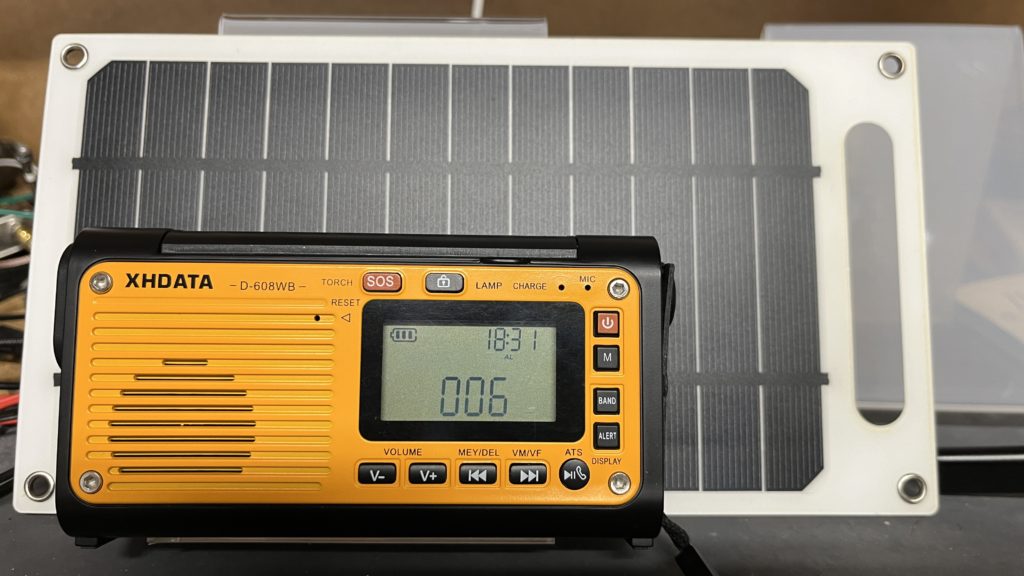
All of the radios in this article, except the CR1015, have the capability to be charged externally through a USB cable, so the solar panel may be an option. I’ll be testing that ongoing.
I made an attempt to measure the battery drain by the weather alert function:
| Radio | Alert current drain | Battery Capacity | Battery |
|---|---|---|---|
| HanRongDa HRD-701 | 50 mA | 1000 mAh | BL-5C |
| HanRongDa HRD-757 | 2500 mAh | 18650 | |
| iRonsnow IR-688 | n/a | 10000 mAh | Internal |
| LiJiANi Rd239 | 60 – 100 mA | 1020 mAh | BL-5C or 3 AAA |
| Mesqool CR1009 Pro | n/a | 5000 mAh | 21700 |
| Mesqool CR1015 | n/a | (750 mAh) | 3 AAA |
| Raddy RF75A | n/a | 1000 mAh | Internal |
| XHDATA D-109WB | 60 mA | 2000 mAh | 18650 |
| XHDATA D-608WB | 70 mA | 3000 mAh (18650) | 18650 |
The radios with no measurement either cannot be powered externally or cannot operate with the battery removed. Battery capacity is reported with the battery shipped with the radio. Higher capacity batteries could be installed in all but the Raddy RF75A and iRonsnow IR-688 that do not have a user replaceable batteries.
Performance
Here are the performance numbers for each of the radios using my midday band scan. If you had a weather emergency, you might actually want to listen to local radio.
The Winner?
It’s the Zhiwhis ZWS-2415. I excluded the Mesqool CR1009 Pro because the weather program was garbled and the XHDATA models because of the false alarms. That left the iRonsnow as the only other emergency radio standing and it’s downrated on broadcast radio performance and ease of operation. The ZWS-2415 also has the best weather resistance rating.
If it weren’t for the false alerts, I might have chosen the XHDATA D-608WB. It’s an attractive and compact package. While FM didn’t work on my review unit, others say it works well, and MW was very good. It’s a decent radio. The inconvenient tuning makes it sub-optimal for shortwave listening. It also has Bluetooth and some bass response on the speaker.
If I wanted to pick the “best radio that has a weather band,” then it’s a tossup between the XHDATA D-109WB and the HanRongDa HRD-757. The XHDATA D-109WB is a good radio, sensitive, and with full HF coverage. It’s also the only one with LW. It has a good memory system and is easy to tune. It has emergency radio features, and uses an 18650 battery. False alerts are a negative. The HRD-757 is less friendly operationally, although that’s less of an issue with has app control. It has bass response, UHF/VHF, Air Band and no false alerts.

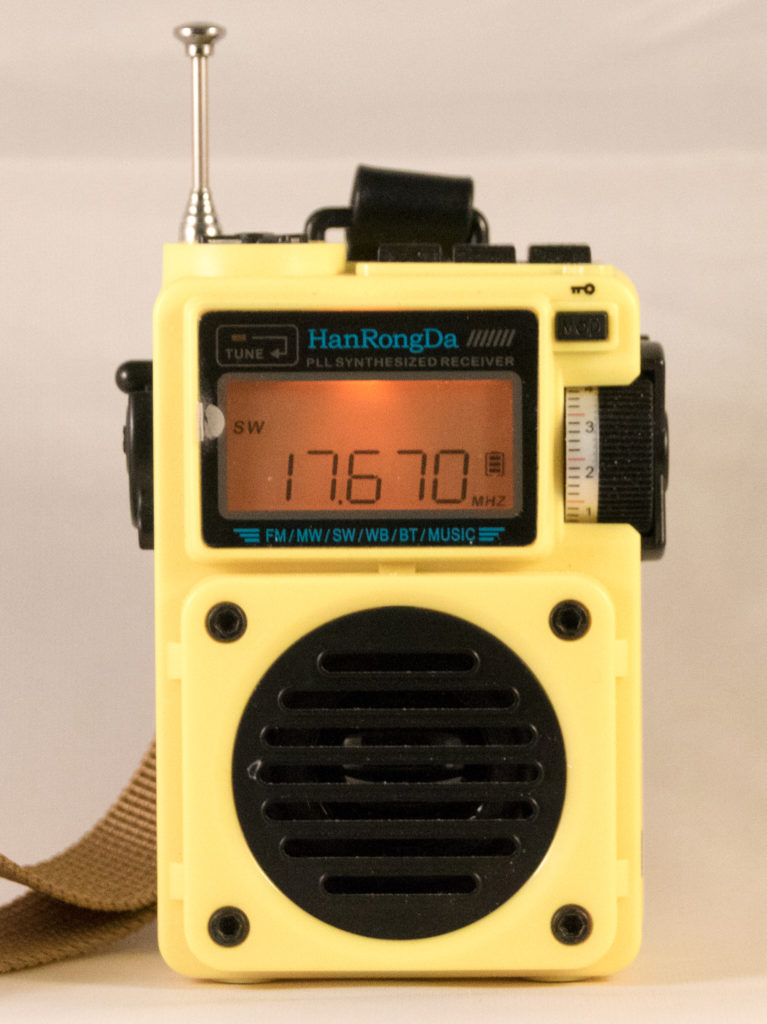

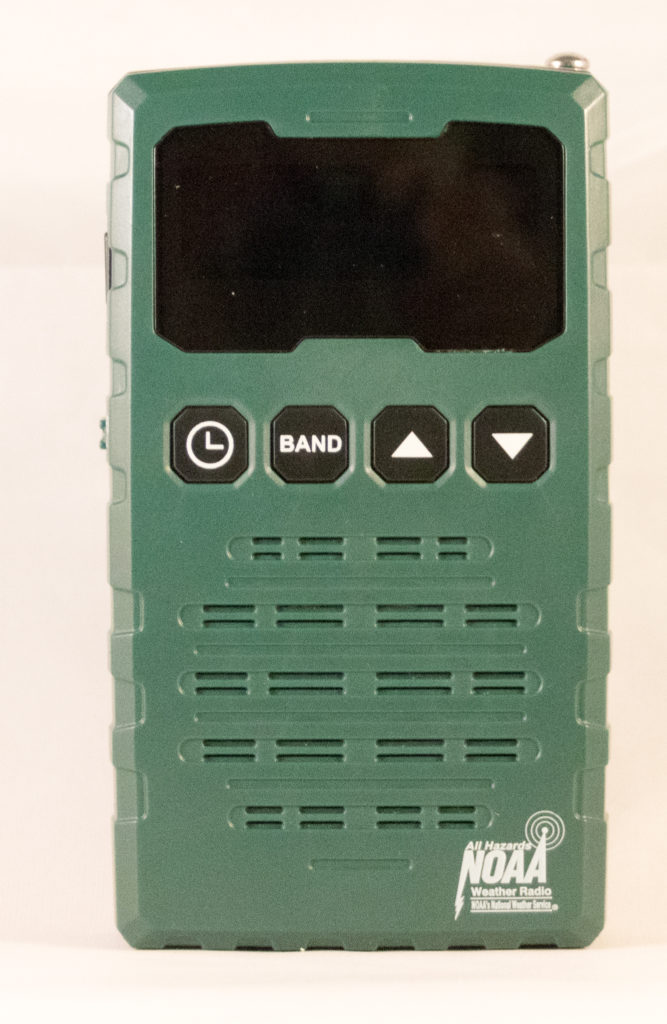
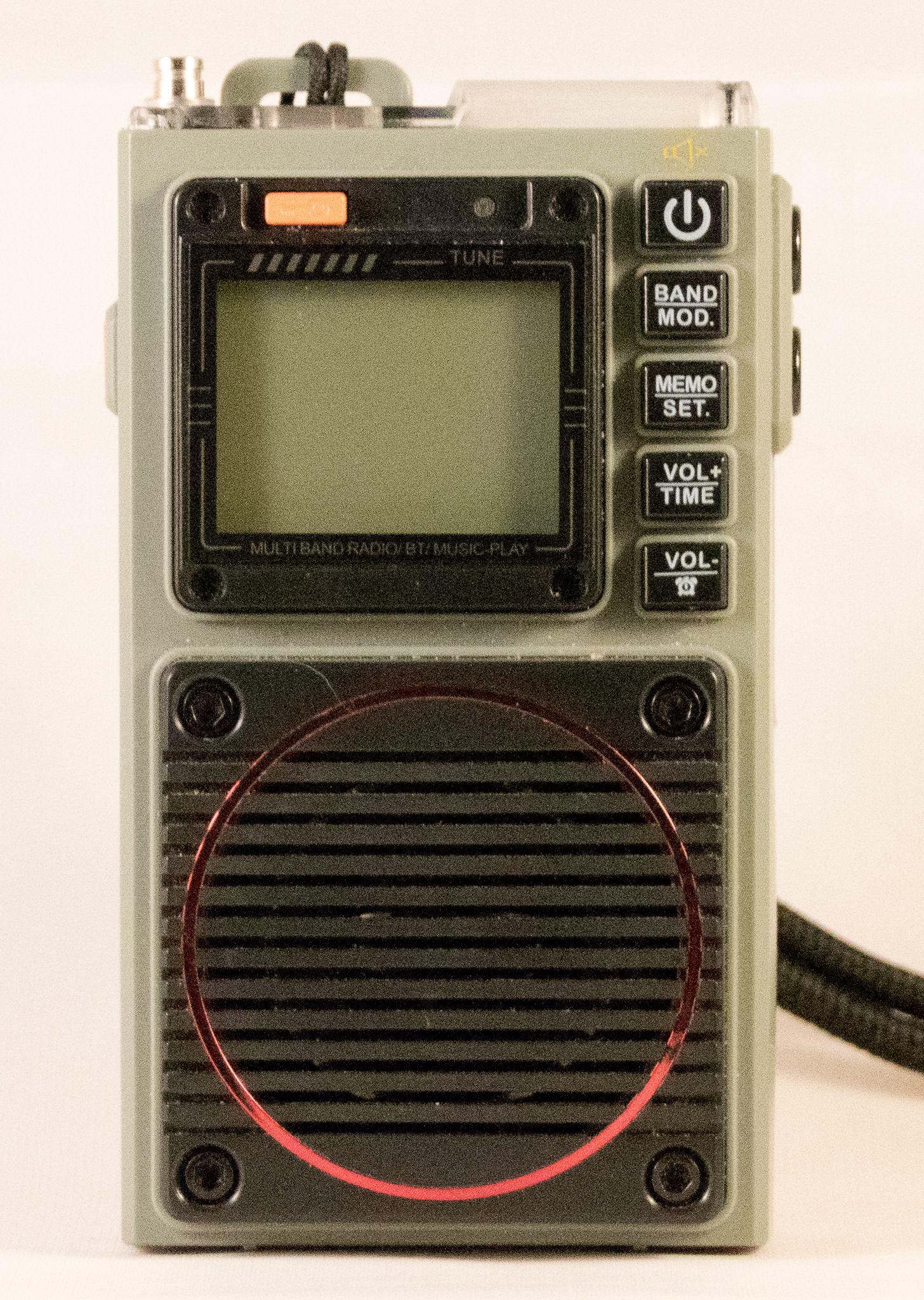
 [robot emoji] symbol. Content comes most often from Microsoft Copilot, bit may also come from Perplexity, ChatGPT or Deep Seek.
[robot emoji] symbol. Content comes most often from Microsoft Copilot, bit may also come from Perplexity, ChatGPT or Deep Seek.
The Mesqool CR1009 Pro and the iRONSNOW are gone to charity, and I added a Raddy RF760 that just incidentally has weather alerts.